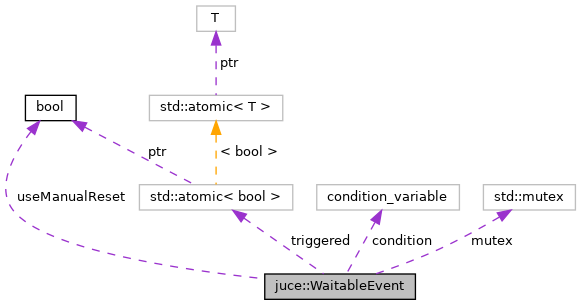Allows threads to wait for events triggered by other threads. More...
#include <juce_WaitableEvent.h>

Public Member Functions | |
| WaitableEvent (bool manualReset=false) noexcept | |
| Creates a WaitableEvent object. More... | |
| void | reset () const |
| Resets the event to an unsignalled state. More... | |
| void | signal () const |
| Wakes up any threads that are currently waiting on this object. More... | |
| bool | wait (int timeOutMilliseconds=-1) const |
| Suspends the calling thread until the event has been signalled. More... | |
Private Attributes | |
| std::condition_variable | condition |
| std::mutex | mutex |
| std::atomic< bool > | triggered { false } |
| bool | useManualReset |
Allows threads to wait for events triggered by other threads.
A thread can call WaitableEvent::wait() to suspend the calling thread until another thread wakes it up by calling the WaitableEvent::signal() method.
@tags{Core}
|
explicitnoexcept |
Creates a WaitableEvent object.
The object is initially in an unsignalled state.
| void juce::WaitableEvent::reset | ( | ) | const |
Resets the event to an unsignalled state.
If it's not already signalled, this does nothing.
| void juce::WaitableEvent::signal | ( | ) | const |
Wakes up any threads that are currently waiting on this object.
If signal() is called when nothing is waiting, the next thread to call wait() will return immediately and reset the signal.
If the WaitableEvent is manual reset, all current and future threads that wait upon this object will be woken, until reset() is explicitly called.
If the WaitableEvent is automatic reset, and one or more threads is waiting upon the object, then one of them will be woken up. If no threads are currently waiting, then the next thread to call wait() will be woken up. As soon as a thread is woken, the signal is automatically reset.
Referenced by juce::MessageThread::start().
Suspends the calling thread until the event has been signalled.
This will wait until the object's signal() method is called by another thread, or until the timeout expires.
After the event has been signalled, this method will return true and if manualReset was set to false in the WaitableEvent's constructor, then the event will be reset.
| timeOutMilliseconds | the maximum time to wait, in milliseconds. A negative value will cause it to wait forever. |
Referenced by juce::MessageThread::start().
|
mutableprivate |
|
mutableprivate |
|
mutableprivate |
|
private |